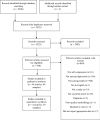A Review of Self-Compassion as an Active Ingredient in the Prevention and Treatment of Anxiety and Depression in Young People
- PMID: 34559347
- PMCID: PMC9005396
- DOI: 10.1007/s10488-021-01170-2
A Review of Self-Compassion as an Active Ingredient in the Prevention and Treatment of Anxiety and Depression in Young People
Abstract
Previous meta-analyses have found higher self-compassion is associated with lower anxiety and depression. The aim of this study was to investigate the efficacy of self-compassion as an active ingredient in the treatment and prevention of anxiety and depression in youth. This was conducted through (i) a systematic review of the literature and (ii) qualitative consultation with young people and researchers in self-compassion. Fifty studies met our inclusion criteria. Eight studies evaluated self-compassion interventions among youth aged 14-24, and the remaining studies measured the association between self-compassion and anxiety, and/or depression among this age group. Qualitative interviews were conducted with four self-compassion researchers. Interviews were also conducted in two rounds of consultation with 20 young people (M age = 18.85 years, age range 14-24 years). Higher self-compassion was related to lower symptoms of anxiety, r = - 0.49, 95% CI (- 0.57, - 0.42), and depression, r = - 0.50, 95% CI (- 0.53, - 0.47). There was evidence for self-compassion interventions in decreasing anxiety and depression in young people. Consultation with young people indicated they were interested in self-compassion interventions; however, treatment should be available in a range of formats and tailored to address diversity. Self-compassion experts emphasised the importance of decreasing self-criticism as a reason why self-compassion interventions work. The importance of targeting self-criticism is supported by the preferences of young people who said they would be more likely to engage in a treatment reducing self-criticism than increasing self-kindness. Future research is required to add to the emerging evidence for self-compassion interventions decreasing symptoms of anxiety and depression in young people.
Keywords: Adolescents; Anxiety; Depression; Review; Self-compassion; Youth.
© 2021. Crown.
Conflict of interest statement
All authors declare that they have no conflicts of interest.
Figures
References
-
- Arch JJ, Warren Brown K, Dean DJ, Landy LN, Brown K, Laudenslager ML. Self-compassion training modulates alpha-amylase, heart rate variability and subjective responses to social evaluative threat in women. Psychoneuroendocrinology. 2014;42:49–58. doi: 10.1016/j.psyneuren.2013.12.018. - DOI - PMC - PubMed
-
- Arimitsu K. The effects of a program to enhance self-compassion in Japanese individuals: A randomised controlled trial. The Journal of Positive Psychology. 2016;11:559–571. doi: 10.1080/17439760.2016.1152593. - DOI
Publication types
MeSH terms
Grants and funding
LinkOut - more resources
Full Text Sources
Medical
Miscellaneous


